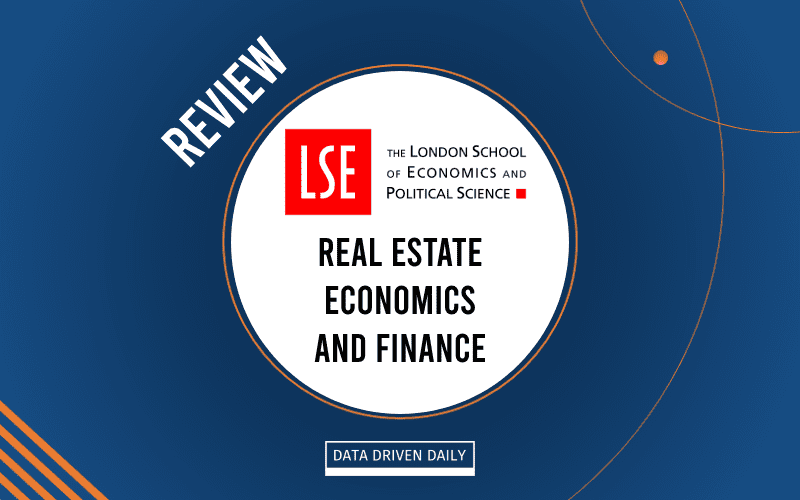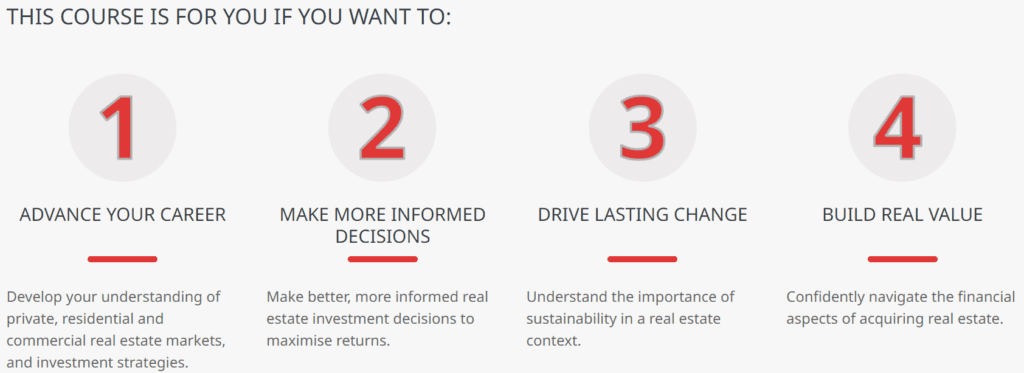In the world of real estate, economics, and finance, intertwining your knowledge with the right credentials could be the bridge between success and mediocrity.
The LSE Real Estate Economics and Finance Certificate emerges as a robust course tailored for this need.
However, is it right for you? We’ll unpack that question and more in this comprehensive LSE real estate economics and finance review.

LSE Real Estate Economics and Finance Review: A Glimpse
If you’ve been searching for an LSE Real Estate Economics and Finance review, you’ve landed in the right spot.
This course, curated by one of the world’s most renowned institutions, promises a transformative experience for its attendees.
What sets it apart is not just the content, but the way it’s delivered. Imagine diving deep into the intricacies of real estate, guided by a faculty that’s world-class, in an environment that stimulates both intellectual and practical growth.
The curriculum is well-rounded, ensuring that participants get a 360-degree view of the industry. But, it’s essential to remember that no course is without its flaws.
While the program offers numerous benefits, potential students should also consider any gaps or areas they might need supplemental learning in.
Overall, based on the course structure, faculty, and the holistic approach, the LSE Real Estate Economics and Finance course definitely deserves the acclaim it receives.
It’s an investment in oneself, promising returns in the form of knowledge, connections, and growth.
What is the LSE Real Estate Economics and Finance Course?
Provider: London School of Economics and Political Science
Duration: 8 weeks
Price: £2,200
The LSE Real Estate Economics and Finance Course is a premier program offered by the London School of Economics.
Designed for individuals who aspire to level up their real estate industry knowledge, this course integrates essential economic theories with the practicalities of real estate finance.
From understanding property market dynamics to diving deep into investment strategies, the program aims to offer a 360-degree view of the real estate world.
Beyond the standard teachings, what sets this course apart is its focus on providing a global perspective.
Participants aren’t just learning about real estate in a localized context; they’re being equipped with knowledge and skills applicable on the international stage. For professionals looking to make a mark globally, this feature is invaluable.
Key Features
The LSE real estate economics and finance certificate has a few features that you should know about:
- Globally Recognized Certificate: Upon successful completion, participants are awarded the “LSE Real Estate Economics and Finance Certificate” – a credential recognized worldwide.
- Experienced Faculty: The course is led by top-tier faculty members who are not only well-versed academically but also possess substantial industry experience.
- Flexible Learning: Catering to working professionals, the course offers flexibility in terms of schedules and learning modes.
- Networking Opportunities: Connect with peers from around the world and broaden your professional network.
LSE Real Estate Economics and Finance Highlights

- Real-world Applications: Unlike courses that focus solely on theory, this program ensures that all learnings are rooted in real-world applications, giving participants a practical edge.
- Dynamic Curriculum: The curriculum is frequently updated to reflect the evolving trends and shifts in the real estate industry.
- Interactive Learning: Through case studies, group discussions, and simulations, participants can expect a highly interactive and engaging learning experience.
- Supportive Alumni Network: Graduates become part of the LSE alumni community, gaining access to a plethora of resources and networking opportunities.
Curriculum and Modules
The LSE Real Estate Economics and Finance course’s curriculum is meticulously crafted to provide participants with a holistic understanding of the subject. The modules are categorized into the following key areas:
- Understanding Real Estate Dynamics: Delve into the intricacies of property market behaviors, the role of economic indicators, and how global events influence real estate.
- Real Estate Investment: Understand the nuances of real estate investment, including risk assessment, ROI calculations, and exploring different investment avenues.
- Finance and Funding: Learn the ins and outs of financing real estate projects, from sourcing funds to understanding the different financial instruments available.
- Global Perspectives: Explore the international real estate landscape, understanding the challenges and opportunities presented by different markets.
In addition to these core modules, participants also engage in:
- Real Estate Case Studies: Analyze real-world scenarios to gain a practical understanding and to sharpen decision-making skills.
- Future of Real Estate: Stay ahead of the curve by exploring the emerging trends and technologies that are set to reshape the real estate industry.
By the end of the program, participants will not only have gained a deep understanding of real estate economics and finance but also the skills and insights to apply this knowledge effectively in their professional lives.
Faculty
One of the standout features of the LSE Real Estate Economics and Finance course is its esteemed faculty. The London School of Economics is renowned worldwide for its academic excellence, and the faculty members for this course are a testament to that reputation.
Distinguished Experts: Each member of the teaching staff isn’t just academically accomplished – they also bring a wealth of industry experience to the table. This blend of academic and real-world knowledge ensures that students get a balanced perspective.
Guest Lecturers: The course occasionally invites guest lecturers – renowned figures in the real estate, economics, and finance sectors – to share insights, case studies, and their unique experiences. These sessions offer invaluable learning opportunities, bridging the gap between theory and practice.
Pros
- Globally Recognized: The London School of Economics name itself carries immense weight. Completing this course instantly adds credibility to one’s professional profile.
- In-depth Curriculum: The curriculum doesn’t just skim the surface but dives deep into every topic, ensuring comprehensive knowledge.
- Networking: With a diverse cohort and alumni network, the networking opportunities are vast and invaluable.
- Future-Focused: The course isn’t stuck in the past. It looks ahead, preparing students for the future of real estate.
Cons
- Limited Specialization: While the LSE Real Estate Economics and Finance Course offers a comprehensive overview of real estate, economics, and finance, there might be certain specialized topics or niche areas within these disciplines that the course might not cover extensively.
- Limited Practical Training: Though the course brings in industry experts and offers real-world insights, it might not provide hands-on training or site visits, which can be essential for individuals looking to gain practical exposure.
LSE Real Estate Economics and Finance Pricing
The LSE Real Estate Economics and Finance course is priced at £2,200. While evaluating this cost, it’s essential to understand what you’re investing in. The LSE, a globally recognized institution, offers an amalgamation of an in-depth curriculum, renowned faculty, and the added advantage of its prestigious name.
Compared to other real estate courses, the LSE’s offering provides significant value. This isn’t just a course; it’s a career-enhancing opportunity, promising practical skills and networking avenues. Given the comprehensive benefits, the price point of £2,200 positions the course as a valuable investment in one’s professional growth.
What I Like About the LSE Real Estate Economics and Finance Course
When you delve into the world of real estate courses, there’s a sheer abundance of options out there.
But the LSE Real Estate Economics and Finance certificate truly stands out. One of the primary aspects I admire is its holistic approach.
The course doesn’t just focus on real estate in isolation; it incorporates economics and finance to provide a multi-dimensional perspective. This holistic teaching is crucial, as the real estate world is not merely about bricks and mortar.
It intertwines with economics and financial shifts at every turn, and understanding this nexus can propel a professional’s career to new heights.
The faculty’s expertise and the legacy of LSE in academic rigor are also noteworthy. Engaging with such esteemed educators provides students not only with knowledge but also with the experience of learning from industry leaders who’ve been at the forefront of research and real-world applications. Plus, the course’s structure, which balances theoretical knowledge with practical insights, ensures that participants are not just equipped with textbook knowledge. They’re prepared to face real-world challenges, making them invaluable assets to any organization they choose to align with.
What Sets This Course Apart?
In the vast landscape of real estate courses, there’s always a race to the top. Everyone claims to have the perfect blend of theory and practicality. But with the LSE Real Estate Economics and Finance, the differentiation is evident from the outset.
Firstly, its foundation at the London School of Economics and Political Science (LSE) gives it an unparalleled edge. LSE’s reputation in the global academic community is nothing short of iconic. By association, any course offered by this institution carries a hallmark of excellence and rigorous standards. And this isn’t just about brand prestige; it’s about the consistent quality of education that LSE provides.
But reputation aside, it’s the curriculum that truly shines. While many courses in the market might offer insights into real estate or economics or finance, the blend of all three disciplines in one comprehensive course is a rarity. Real estate doesn’t operate in a silo. It’s impacted by economic trends and is deeply intertwined with finance. This course, by bridging these disciplines, offers a multi-dimensional, holistic view, making its graduates uniquely positioned to understand and navigate the nuances of the industry.
Furthermore, the real-world applicability of this program is another defining factor. It doesn’t restrict its teachings to theoretical knowledge. Instead, it bridges the gap between theory and practice, enabling students to apply their learning in tangible scenarios. The faculty, with its vast industry experience and academic prowess, further enhances this by bringing real-world examples, case studies, and interactive discussions into the classroom.
Lastly, the network. Engaging with a cohort of diverse, globally sourced professionals and being a part of the LSE alumni network can be transformative. It’s not just about the knowledge gained during the course, but the relationships forged, the collaborations birthed, and the global perspective developed.
In sum, the LSE Real Estate Economics and Finance doesn’t just stand out because of its name or its curriculum alone. It’s the perfect storm of reputation, content, applicability, faculty, and networking that truly sets it leagues apart from its competition.
Who Should Take This Course?
This course is tailored for:
- Real Estate Professionals: Individuals already in the real estate sector looking to enhance their knowledge and skills.
- Finance Professionals: Those in the finance sector wanting to pivot or expand into real estate.
- Aspiring Entrepreneurs: Individuals eyeing the real estate sector for entrepreneurial ventures.
- Academics and Students: Those looking for an in-depth academic understanding of real estate economics and finance.
Bottom Line
The LSE Real Estate Economics and Finance Course is more than just another academic program – it’s a gateway into the complex world of real estate, seen through the lens of economics and finance.
With a legacy institution like LSE at the helm, the course promises not only knowledge but also prestige.
It’s an investment, both in terms of time and money, but for those serious about making a mark in the world of real estate, it’s an investment that’s likely to pay off manifold.
Ben is a full-time data leadership professional and a part-time blogger.
When he’s not writing articles for Data Driven Daily, Ben is a Head of Data Strategy at a large financial institution.
He has over 14 years’ experience in Banking and Financial Services, during which he has led large data engineering and business intelligence teams, managed cloud migration programs, and spearheaded regulatory change initiatives.